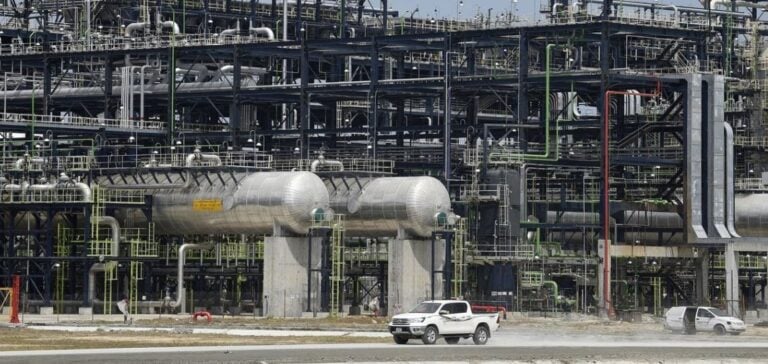Dangote’s refinery, due to open in May 2023 at Lekki, near Lagos, aims to transform the Nigerian fuel market.
With a production capacity of 650,000 barrels per day, the facility is expected to reduce Nigeria’s dependence on refined fuel imports.
Despite being Africa’s leading crude oil producer, the country imports almost all its fuels, a paradox that has persisted for decades.
Yet, despite high expectations, the refinery is still not operational, and questions persist about the timing and price at which gasoline will be sold on the domestic market.
Authorities and economic players remain cautious.
The Nigerian National Petroleum Company (NNPC), the sole purchaser of gasoline for the local market, has mentioned a possible start of sales on September 15.
However, successive delays and ambiguous communication have sown doubts among industry observers.
Fluctuating world crude oil prices and refining costs are also fuelling uncertainty about the possibility of maintaining competitive prices on the domestic market.
Sales Strategies and Price Uncertainties
The price outlook for gasoline produced by the Dangote refinery is far from clear.
According to SBM Intelligence’s Ayotunde Abiodun, market realities, including oil prices, logistics costs and refining margins, may make substantial price reductions impossible in the short term.
Many Nigerians, already hit by a 45% increase in pump prices following the removal of subsidies in May 2023, are hoping for stabilization.
However, economists believe that these expectations are over-optimistic, given that the Dangote Group must amortize a massive $20 billion investment to build the refinery.
To recoup this investment, Dangote may choose to sell a significant proportion of its production on international markets, where margins are higher.
This choice raises questions about the company’s commitment to meeting domestic needs.
If the sales strategy prioritizes exports, the expected impact on reducing domestic prices and ending shortages could be limited.
It would also pose challenges for NNPC, which continues to accumulate significant debt by buying fuel at a higher price than it resells it.
Crude Oil Supply: A Critical Issue
Crude oil supply remains a major sticking point between Dangote’s refinery and the Nigerian authorities.
According to industry sources, NNPC has not always been able to supply the necessary crude on competitive terms.
This situation forces Dangote to source crude from international markets, where crude is $3 to $4 per barrel more expensive than domestic prices.
In this context, sourcing strategy becomes crucial to the refinery’s economic viability.
Access to competitively priced crude oil could determine whether the refinery can offer reasonable prices on the local market.
Political tensions surrounding these supplies are also something to watch out for.
Current President Bola Ahmed Tinubu appears to be less close to Dangote than his predecessor Muhammadu Buhari, which could influence the dynamics of relations between the company and the state.
This political situation, combined with international competition, could alter the refinery’s operating conditions and its ability to meet national energy needs.
Monopoly risk and market reactions
The possibility of a Dangote monopoly on the Nigerian fuel market is causing concern among industry players.
If the refinery becomes the main source of gasoline for Nigeria, this could significantly restructure the market.
Local and international oil traders fear that this dominant position will hamper competition, altering the import and distribution dynamics that have prevailed for decades.
However, the Dangote Group rejects these concerns, claiming that current market conditions do not guarantee a monopolistic situation.
The company maintains that it remains open to collaboration with other players in the sector.
Despite this, the issue of competition and transparency in the Nigerian oil sector remains topical, particularly with national crude production falling to less than 1.2 million barrels per day by 2023, far short of the government’s target of 2 million.
Consequences for the Nigerian Energy Sector
Dangote’s refinery could represent a unique opportunity for Nigeria to restructure its energy sector.
However, economic, political and logistical challenges remain.
Sales strategies, crude supply and relations with the government will be crucial to the future of this facility.
The Nigerian fuel market is still waiting for clarity on the real impact of this new refinery on domestic prices and energy security.






















